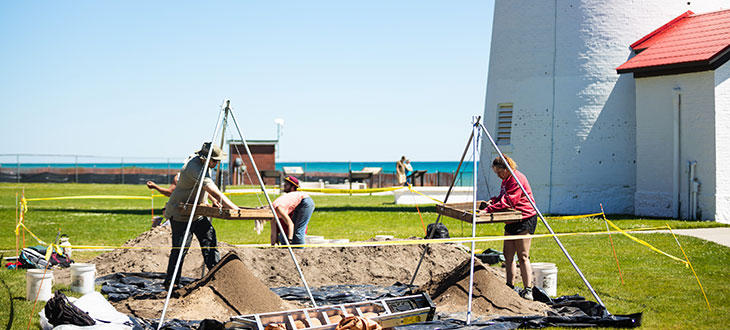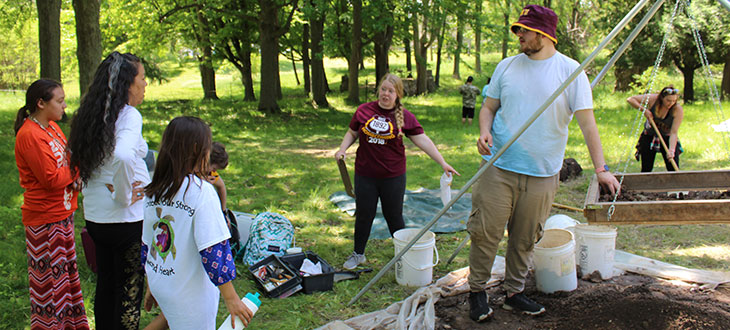Digging into Michigan’s past
CMU anthropology prof partners with community members to preserve cultural history
For many people, the idea of spending a day knee-deep in dirt at the site of an old privy may not sound like fun. But for Central Michigan University students enrolled in Sarah Surface-Evans' archaeological field school summer course, it's the perfect setting for a treasure hunt.
It also is hands-on career training for students hoping to pursue jobs in cultural resource management.
Surface-Evans, who teaches in the anthropology program, specializes in community-based archaeology. She has partnered with the Saginaw Chippewa Indian Tribe to study the Mount Pleasant Indian Industrial Boarding School and also has worked with community organizations and local governments to research and explore historical sites around the state.
Members from the community are often deeply involved in the study and interpretation of the findings, which Surface-Evans said is key to generating greater public appreciation for local heritage sites.
“Archaeology can help us fill in the gaps about what people were doing and what life was like.” – Sarah Surface Evans, anthropology faculty member
Shining a light on history
Surface-Evans said some of her most interesting projects have been Michigan's lighthouses.
"Lighthouses are complex heritage sites that often require preservation and study of both historic structures and archaeological deposits within the ground," she said.

Her team rediscovered a narrow-gauge railroad at 40 Mile Point Lighthouse in Rogers City, Michigan, and recovered toys and personal items belonging to the family of a lighthouse keeper at McGulpin Point Lighthouse in Mackinaw City, Michigan.
In 2016, her students began work at the Fort Gratiot Lighthouse in Port Huron – Michigan's oldest lighthouse.
Students excavating the site this summer discovered bits of pottery, buttons and even a thimble dating back to the mid-1800s at the site of the keeper's house and, near the site of the privy, items such as medicine bottles and a porcelain doll.
"Archaeology can help us fill in the gaps about what people were doing and what life was like," she said.
Some of the items uncovered will be taken back to CMU for additional research, Surface-Evans said. The artifacts will be returned to St. Clair County, which manages the site, along with a report on CMU's findings.

During this year's excavations at the Port Huron lighthouse, the CMU students had many opportunities to engage with park visitors. They were able to share their findings and answer questions — children from a local summer camp even joined in to help with the dig.
"We have people coming from all over the world to visit this park. It's so much fun to talk with them and to share this with them," Surface-Evans said.
Preserving cultural history
When the Saginaw Chippewa Indian Tribe purchased a portion of the former Mount Pleasant Indian Industrial Boarding School, Surface-Evans was invited to serve as a consulting member of the committee formed to oversee the property.
In the late 1800s, Native American children from many states were removed from their homes and forced to live at the boarding school — one of many established by an 1891 act of the U.S. Congress to force assimilation and Christianity on Indigenous people. It was finally closed on June 6, 1936.
Surface-Evans has spent several years intensely researching and studying the site, often involving her classes in experiences that result in student research projects and publications.

In 2016, the Saginaw Chippewa Indian Tribe, city of Mount Pleasant and CMU received a Governor's Award for Historic Preservation in recognition of the group's collaboration on archaeological research and educational programming.
"I assisted in writing the nomination and chaired a team that pulled together the historical documents, oral histories and archaeological data necessary to make a strong argument for designating the school as a historic district," Surface-Evans said.

She also testified before the State Historic Preservation review board about the importance of the site. The school was added to the National Register of Historic Places in February 2018.
A win-win arrangement
Surface-Evans said her students will continue work at the boarding school site and also may begin research at a lumber camp site in Clare County next year.
"These experiences allow students to put to work what they learn in the classroom," Surface-Evans said. "The resulting research benefits the community and the students."